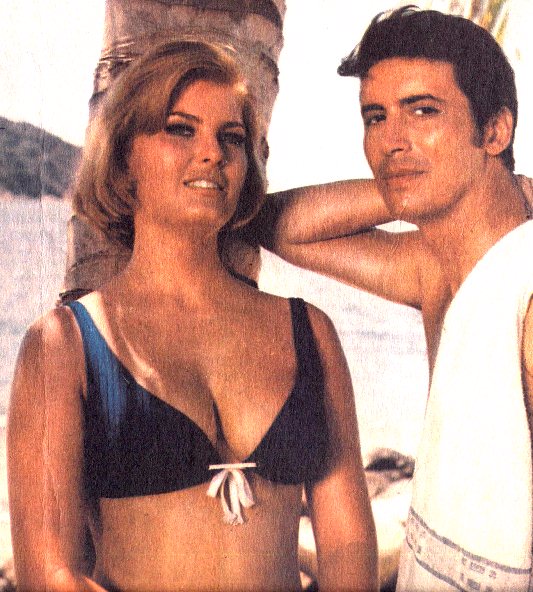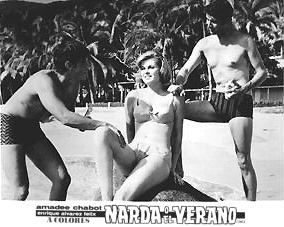
(CLASA Films Mundiales, 1968) Exec Prod: Héctor López; Dir/Adapt: Juan Guerrero; Orig. Story: Salvador Elizondo; Photo: Gabriel Figueroa; Music: Joaquín Gutiérrez Heras; Arrangements/Playbacks: Alicia Urreta; Theme Song sung by: Monna Bell; Prod Chief: Enrique L. Morfín; Asst Dir: Winfield Sánchez; Film Ed: Carlos Savage; Art Dir: Manuel Fontanals; Decor: Jorge Grandjean; Makeup: Ana Guerrero; Sound Supv: James L. Fields; Sound: Javier Mateos, Galdino Samperio; Eastmancolor; Union: STPC
A video version with English sub-titles was released of this film on the Condor label, although it is now out of print.
CAST: Enrique Alvarez Félix (Max), Amedee Chabot ("Narda" (Elise)), Héctor Bonilla (Jorge), Lázaro Patterson (Prince Chomba), Pixie Hopkin (Mariana), Lourdes Guerrero (Joyce Proust), Martín Guevara, Francisco Meneses, Beatriz Sheridan (?dubs Amedee Chabot), Claudio Obregón (voiceover)
NOTES: although this film
wasn't critically well-received, and was disowned by the author of the
story on which it was based, Narda o el verano is an entertaining
if enigmatic film and as an added bonus features Amedee Chabot. In fact,
Chabot--although her dialogue was dubbed by a deeper voice than usual,
which seems a bit out of place--looks as good as she ever did on screen,
with her hair cut in a modified page-boy style. Her beautiful figure is
revealed in several nude scenes.

Still photographer Jorge and his friend Max are going to spend the summer in an Acapulco beach house. They decide to "share" a woman for the season, partially "because it's cheaper," but also for philosophical reasons not entirely elucidated. After various false starts (at a disco, Jorge's choice says she is a virgin, and Max's partner balks at the prospect of a menage a trois; later, they cruise the airport but one candidate has several small dogs who soil Jorge's shirt, and another--called "Lolita"--is greeted by an older man), they hook up with two vacationing gringas on the beach and make a date for later that night.
But on the way to meet the women, Max and Jorge stop at an African restaurant for dinner. The host (who is also the owner, waiter, and in charge of entertainment) is Prince Chomba (who plays "Für Elise" on a marimba made of human skulls). He introduces them to the only other customer, a beautiful blonde. She says her real name is Elise, but this summer she wants to be called "Narda," like the girlfriend of comic strip hero Mandrake the Magician. The previous summer, Narda was Chomba's lover, but now she has moved on. She agrees to Jorge and Max's proposition, although she says: "I'm not yours--you're mine." Max replies, "Either way, it's the same," but Narda disagrees: "No, it's completely different."
In any event, the first night both Max and Jorge get drunk and pass out on the beach without even touching Narda. However, she doesn't back out on their deal. Max and Narda make love on a sailboat in the middle of the bay. While they are offshore, Chomba appears and asks Jorge--who is snapping photos on the beach--to take a nude photograph of Narda, offering to trade pornographic photos of Marilyn Monroe and Rudolph Valentino for it! Jorge agrees.
After Jorge and Narda sleep together, Max becomes jealous and calls Narda a whore, but they reconcile. One evening, Narda proposes they go swimming in the nude, but Jorge suggests she dance for them first. After Narda has stripped, Jorge takes a photograph. Narda is shocked and angry, and drives off. The two young men follow her to town, and find her kissing another man in a nightclub. She tosses their car keys on their table, but refuses to speak to them. Later, Jorge gives Chomba the roll of photos he took, but discovers the pictures he got in return were fakes (instead of Valentino, it is a photo of Chomba in an Arab headdress!).
Time passes, and the summer comes to an end. Max has been most affected by Narda's absence. He and Jorge are brought to the police station to identify a body found on the beach; it is Mariana, an old acquaintance of theirs, but Jorge says it is Narda. Back at the beach house, Max tells Jorge he's taking a cab to the airport--their friendship is over.
When Jorge develops the photos he took, Narda's image is blurred and indistinct in every picture, while everyone else--even in the same photo--is perfectly clear. As the film ends, Jorge is heard in voiceover: he came back to Acapulco several times after that summer, but it wasn't the same. Sometimes, he says, "I'm fed up and life is just shit."
Narda is reasonably entertaining, although it starts from a false premise--Max and Jorge agreeing to share a woman--or at least this idea isn't developed logically. There could be a homosexual undercurrent here, although it's possible this is more noticeable in hindsight, based on '90s sensibilities and Enrique Alvarez Félix's rather androgynous screen image.
There is a strong  suggestion that
Narda is some sort of supernatural being: she is first shown emerging from
the sea and is last seen walking back into it, she "magically" appears in
the empty restaurant when Chomba plays "Für Elise" on his
skull-xylophone, and the fact that her image won't show up on film is also
a dead tip-off (and probably the reason Chomba wants Jorge to take a
picture of her, since his efforts were unsuccessful). In one scene, Narda
befriends a kitten, but suddenly changes her mind and chases it away; this
is the only scene (other than her arrival and departure from the ocean) in
which Narda appears alone and while vague, suggests she is afraid of
harming the cute animal.
suggestion that
Narda is some sort of supernatural being: she is first shown emerging from
the sea and is last seen walking back into it, she "magically" appears in
the empty restaurant when Chomba plays "Für Elise" on his
skull-xylophone, and the fact that her image won't show up on film is also
a dead tip-off (and probably the reason Chomba wants Jorge to take a
picture of her, since his efforts were unsuccessful). In one scene, Narda
befriends a kitten, but suddenly changes her mind and chases it away; this
is the only scene (other than her arrival and departure from the ocean) in
which Narda appears alone and while vague, suggests she is afraid of
harming the cute animal.
On the whole, a worthwhile film on a number of levels.
Posted 31 May 99 by dwilt@umd.edu